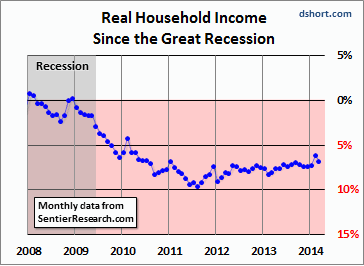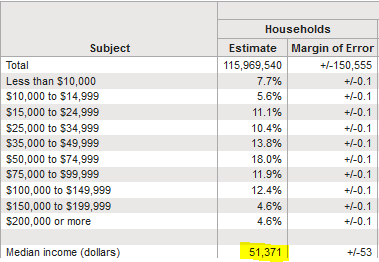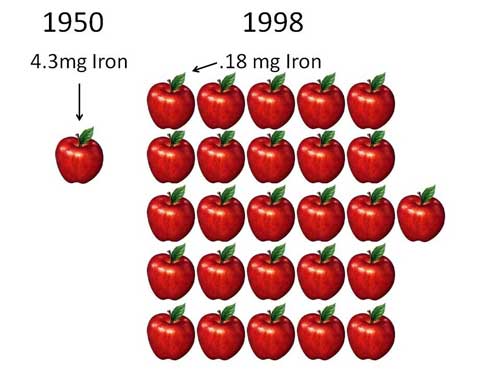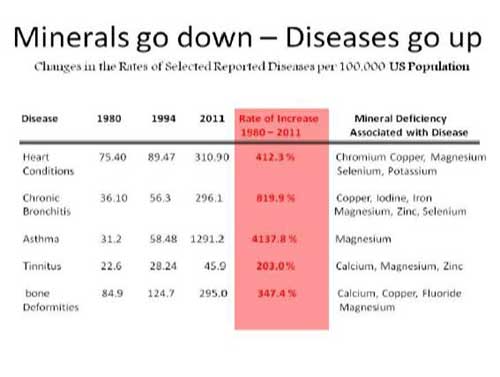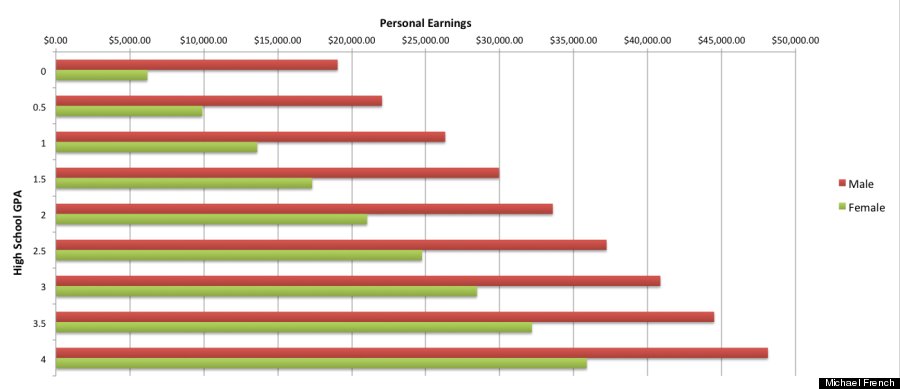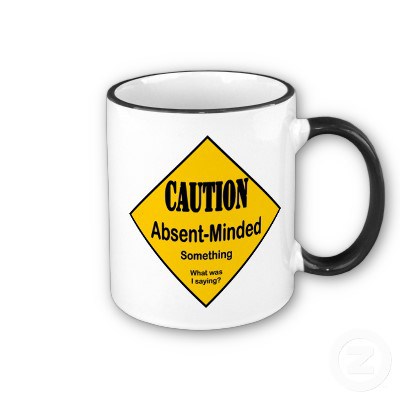The money to fund great things and innovations and programs is gone in our lifetime; it's all gone to debt. So we won't be able to solve global warming or have the transportation that we needed for the 21st century. We should be supporting people with great ideas, but it's gone, and now it's gotta be paid back with interest to banks in China.
Michael Moore
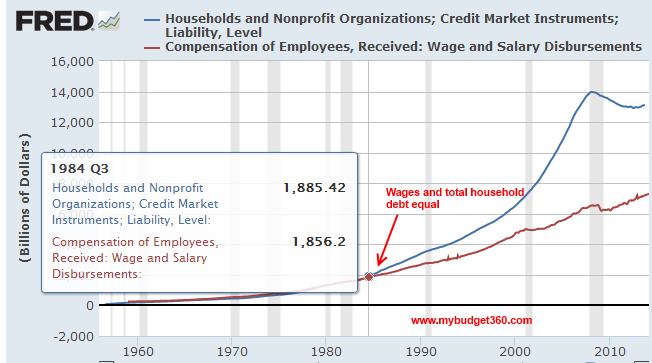
As far as most Americans are concerned, our earning power—after inflation is factored in—has been virtually stagnant for over 30 years. Interestingly, that has not be experience of the citizens of many other developed nations. Their earnings have increased.
So, what do we, Americans, do? Someone else in the household goes out to work—and then we go into debt—because the system is set up to encourage that, and the alternative is a decline in our standard of living. Besides, everyone is doing it.
Our last foray into housing based debt didn’t work out so well (the Great Recession was the result). Now, we’re doing it again (student loans and auto debt, for instance).
Should we be incurring all this debt? Almost certainly not, but there is little choice in a more and more of the workforce is being—quite deliberately—inadequately paid.
I regard the economy as a sort of real-life mystery story. I haven’t quite got the ego to assume it is all staged for my benefit, but I get as much fun out of it as if it was.
And I feel the pain more than I want to admit. Forgive me. I seem to lack the character to see so much preventable human misery—and be indifferent.
Perhaps the greatest mystery—which I commented on yesterday—is the average American’s reluctance, or inability, to try and figure out what is going on. I would have thought that sheer self-interest would have dictated more intellectual curiosity—but apparently not.
Damnably odd.
Right now, the general scenario being promulgated by media pundits—and by this administration—is that, as from 2009, we are recovering from the worst recession since the Great Depression, and though we are growing more slowly than we would like, unemployment is coming down, house prices are going up, and corporate profits at a virtually all time high, the stock market is booming—so we’ll be back to normal real soon now.
What is “normal?’ We don’t define that very well—or even attempt to, because we have a habit of fudging fundamental questions—and of measuring our economic welfare the wrong way (our growth rate is an entirely inadequate way to measure this) but many would probably describe “normal” as unemployment of five percent or less, and a growth rate of three percent or more.
“Normal” within the context of the current economy is not a goal we should be aiming for. As I have written so often before, the American Business Model is suffering from serious structural problems. As a minimum, it needs a drastic overhaul. The issue is less the nature of capitalism itself (which certainly has its weaknesses) but the American version of it (rigged to favor the ultra-rich, and the corporations they largely own, financialized, legalistic, monopolistic, authoritarian, confrontational, anti-union, predatory, environmentally hostile, and socially unjust). Other nations—including most of Northern Europe—are also capitalist, but (as far as the average citizen is concerned) are delivering superior results.
What do I mean by “superior results?” The list is long—but the totality adds up to a superior quality of life as far as most people are concerned—which may help to explain why Northern Europeans live in excess of three years longer and are healthier. The list includes:
- Less stressful lives overall.
- Management through co-operation rather than confrontation
- Better—and increasing—take-home pay.
- Vastly superior social safety-net.
- Vastly superior worker rights.
- Longer vacations.
- Superior education
- Superior training.
- Superior—and much less expensive—healthcare.
- Better public transport.
- Better infrastructure.
- Better protection for the environment.
- Higher productivity.
- Greater energy efficiency.
But surely, all of this makes Northern Europe internationally uncompetitive—and discourages investment?
Well, this what the U.S. Right Wing likes to say—and is a theme which our (corporately owned) media harp on continually—but the evidence says otherwise. Indeed, most major U.S. corporations are heavily invested in Northern Europe—and the only reason they are is because they do well there despite the fact that corporate power is decidedly more restricted there.
Here are a few current thoughts on the U.S. Economy.
THE ECONOMY IS SUFFERINGFROM A SEVERE LACK OF DEMAND. Having vastly weakened the union movement in the private sector, for some years now (in ways both legal and illegal), business has been forcing wages and salaries down—with considerable success. However, well paid employees are fundamental to domestic demand—and that has been severely squeezed in the process. So, where is demand going to come from—particularly as the wage squeeze is continuing? Sectors such as aircraft construction and energy are thriving, but other sectors employing large numbers of people—such as retail—are lackluster.
You can make a strong case that the public sector could have a major role here—and I would so argue—bur currently such action is politically impossible.
The lack of demand issue is fundamental to our current sluggish economy—and is receiving inadequate attention.
THE ECONOMY IS SUFFERING FROM A SEVERE LACK OF INVESTMENT BY BOTH THE PUBLIC AND PRIVATE SECTORS. We all know that today’s prosperity is based upon yesterday’s investment—but we have been under-investing in both the public and private sectors for decades. By international standards (though many Americans feel otherwise) this has kept taxes low and pushed share prices high—but at vast longer term cost. We have been eating our seed corn.
The shortfall is in trillions of dollars. It is most evident where infrastructure is concerned—but we have severe problems in the private sector as well, despite the fact that corporations are flush with cash. They have chosen not to invest. For instance, the average age of capital equipment used in business is 7.4 years, the highest in 20 years. That doesn’t seem particularly old—but more and more of it is computer related, and that is a very long time in computer terms. Our competitors, who save vastly more, are also investing more across the board—and, thanks to superior educational standards and cultural differences, are investing better.
Where the latter point is concerned—and it is controversial—let me contrast our vast investment in (overpriced) defense with Europe’s vast investment in infrastructure.
THOUGH THE FINANCIAL SECTOR HAS BEEN REFINANCED BY THE FED, IT IS STILL NOT LENDING. The financial sector has fundamentally been refinanced by the Fed lending the big banks money at near zero interest rates which the banks then use to buy risk-free government and other securities—which pay higher interest rates. An idiot could make money under such circumstances—and such a system is viciously unfair to U.S. taxpayers.
In fact, it is hard to find a better example of how this economy is rigged to favor the ultra rich (who largely own the banks). Ironically, the now financially flush banks are not investing to a significant extent in the real economy—which is the stated object of the exercise—but are busy lending to the government and speculating. In effect, they are up to their old tricks.
BIG BUSINESS CONTINUES TO WORSHIP SHORT-TERMISM. Short-termism has become the cultural norm for U.S. Big Business. Essentially it involves a pattern of behavior intended to optimize short-term profits—but which tends to put at risk the longer term health of the enterprise. It tends to drive share prices up which rewards CEOs and other senior executives who are primarily rewarded through share options. It includes layoffs, driving down wages and salaries, minimizing training, cutting back on research and development, under-investment, mergers and acquisitions, share buybacks—and financial engineering of all kinds.
All of this pleases Wall Street, but is disastrous for the National Interest. It helps to explain why so many of our competitors from developed nations—and elsewhere—can out-trade us.
BIG BUSINESS CONTINUES TO HAVE AN ADVERSARIAL RELATIONSHIP WITH LABOR. The U.S. has the worst labor relations of any developed country—and U.S. management has the most authoritarian and confrontational attitudes. Quite how this is supposed to enhance worker performance and productivity defeats me. It is a fundamental and largely unrecognized problem.
THOUGH SMALL BUSINESS IS CREATING MOST JOBS, IT IS STILL NOT BEING ADEQUATELY FINANCED. It is something of a paradox that while the Fed has recently been pointing out that small business is creating most jobs, virtually its entire program is focused on supporting big business. The financing of small business remains inadequate. A great deal could be done in this area.
CORPORATE PROFITS EARNED FROM COMPANIES DEPENDENT ON U.S. TRADING ALONE ARE BEGINNING TO SUFFER. U.S. corporations used the 2008-9 Great Recession to cut costs ruthlessly—and, in particular, cut labor costs and cut back on investment. These measures have had the effect of boosting corporate profits considerably since the recession but the longer term effects are questionable because domestic purchasing power is being eroded. This has impacted numerous corporations from Wal-Mart to Sears to the Red Lobster chain (owned by Darden).
PRODUCTIVITY IS NOT IN GOOD SHAPE. Productivity has been growing at less than half its historical track record since 2011—and actually declined in the first quarter of 2014. Why so? Lack of investment is certainly one reason. Another may be that that labor cuts have been excessive. Dissatisfaction with working conditions may well be a third.
EXCESSIVE HEALTHCARE COSTS REMAIN A BURDEN. The fact that we are paying nearly twice as much for healthcare—for a generally inefficient service—puts us at a permanent competitive disadvantage to the competition. This is partially offset by advantages we have in other areas such as energy costs (though we are inefficient in its use compared to many of our competitors). However, we have a further serious problem where health is concerned: as a population we are less healthy—which has both cost and productivity consequences.
OUR EDUCATION IS INFERIOR. Although some of our schools, colleges, and universities are excellent—our overall standard is mediocre. Worse than that, blatant income inequality is leading to the production of a vast, socially deprived, under-educated sub-class which represents both a vast cost and a staggering waste of human resources. Yes, an under-paid, under-educated, undertrained, sub-class does tend to keep wage costs down, but at a major cost to society as a whole.
OUR WORKFORCE TRAINING IS INFERIOR. Many of our competitors have highly developed public/private apprenticeship and other training programs. These are expensive, but demonstrably effective. U.S. business, subject to some regional initiatives, has nothing comparable.
OUR LIMITED GROWTH IS HEAVILY DEPENDENT ON HOUSEHOLD DEBT. It is hard for most of us to appreciate how badly we have done—by international standards—over the last three decades or so. In effect, if inflation is factored in, most of have experienced virtually no increase in earning power—whereas our costs have rocketed. In order to maintain our stand of living, additional household members (typically women) have started to work—and we have gone into debt. In fact, whereas wages and household debt were roughly equal in the early Eighties, household debt has now doubled.
HOUSING PRICES ARE UP PRIMARILY BECAUSE INVESTORS HAVE ENTERED THE MARKET. Financial commentators tend to give the impression that it is a good thing for housing prices to go up. That is not necessarily so. If owner occupiers are bidding prices up through healthy demand, that is one thing (though it can be problematic in itself). On the other hand, if houses are bought on a large scale for investment purposes, it is likely to bid prices up above the level of general affordability—which is exactly what has been happening.
Currently, we have a situation where household income is either stagnant or declining—yet housing costs are going up. That, in itself, drains more purchasing power out of the economy.
An additional problem re housing stems from student debt which provides a disincentive to the young to commit to housing debt, Student debt is currently $1.2 trillion—and rising fast.
THE STOCK MARKET IS PRIMARILY OWNED BY THE RICH AND OPERATES NEAR INDEPENDENTLY OF THE REAL ECONOMY. The Stock Market is supposed to serve the real economy—not the other way round. It is supposed to ?channel scarce resources into the most deserving businesses while preserving liquidity. Primarily, it doesn’t do that anymore. It has become a casino for the rich. Worse than that, because of its focus on the short-term, it has fostered a short-term culture which has proved detrimental to the U.S. economy as a whole.
UNEMPLOYMENT IS DOWN BUT THE REASONS ARE CONCERNING. Job creation has increased but two causes of concern are that so many have dropped out of the labor market—and well paid jobs have been largely replaced by badly paid jobs. Labor force participation is at an all time low.
Does this signify disillusionment with the American Business Model—and the long unfulfilled promise of the American Dream? Well, it is certainly suggestive that all is not well.
Recently, the International Trade Union Federation graded worker rights over 139 countries. 97 worker rights metrics were evaluated. Each country was graded on a scale of 1 to 5—with 1 being the best and 5 the worst. Only Denmark achieved a perfect score.
The U.S. scored a 4, indicating “systematic violations” and “serious efforts to crush the collective voice of workers.” The map below shows the results—with darker being the worse.

CONCLUSION. The worrying thing about all this—and it is scarcely a mystery—is that we are not discussing it and doing something about it. Is this crazy or what? The good news is that I haven’t listed a single issue which we could not resolve with relative ease—given political will.







